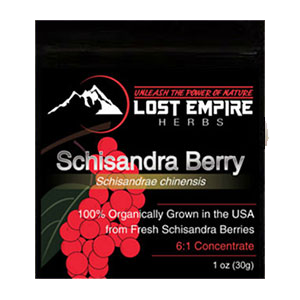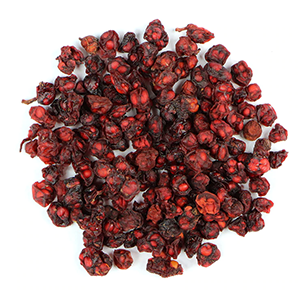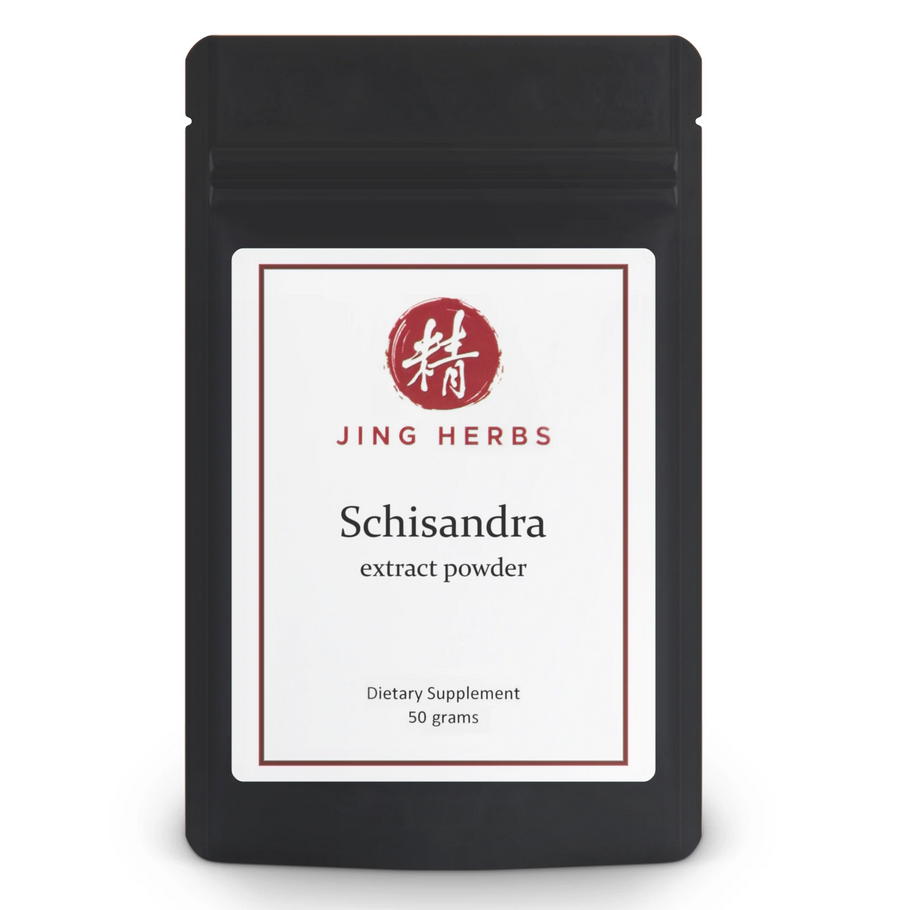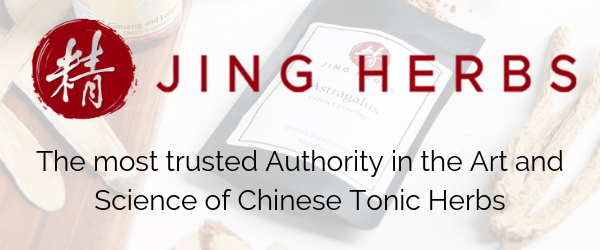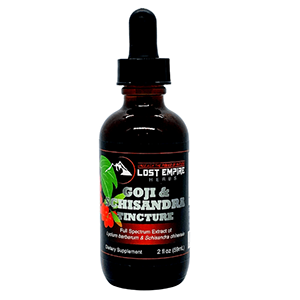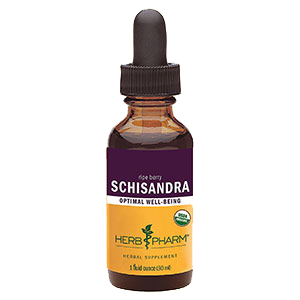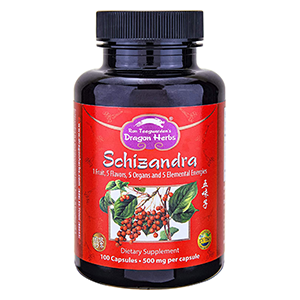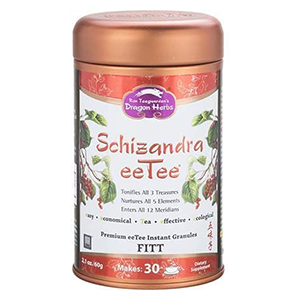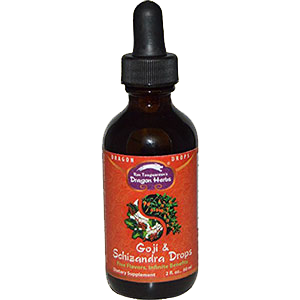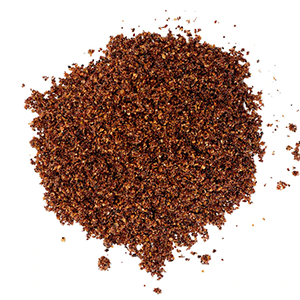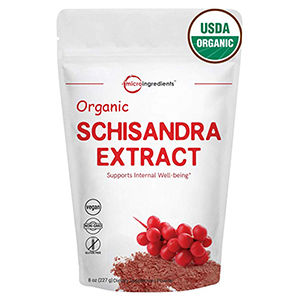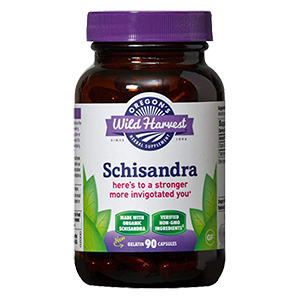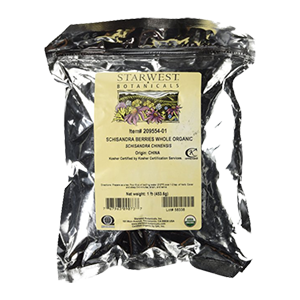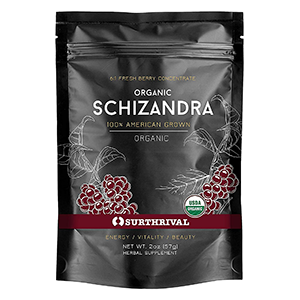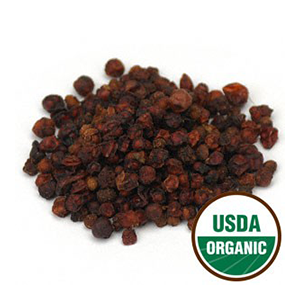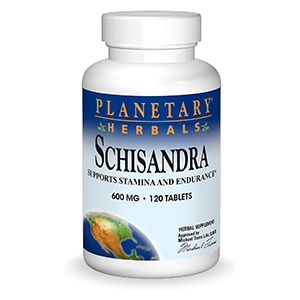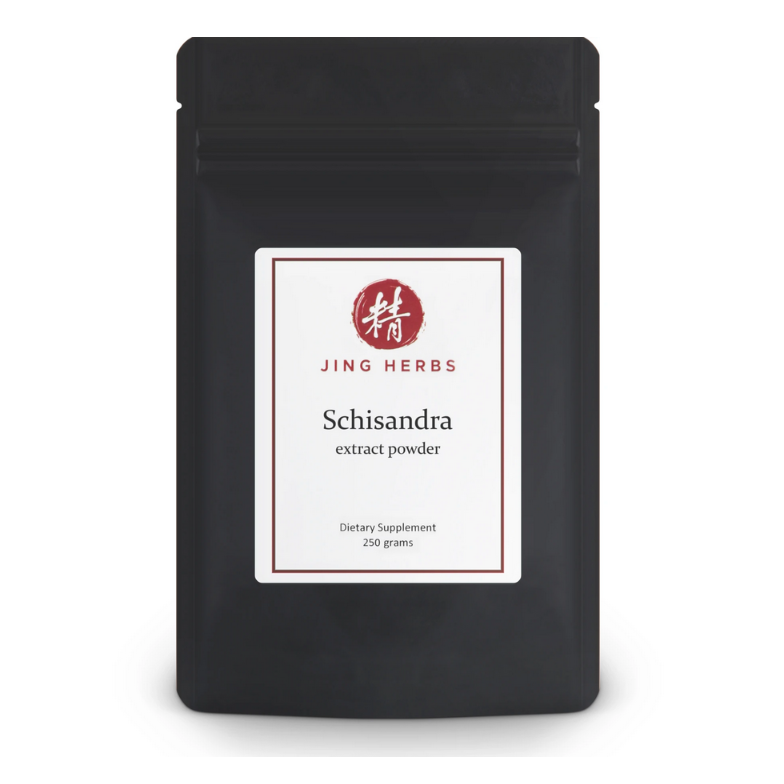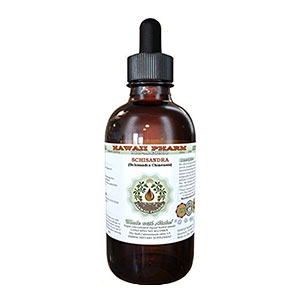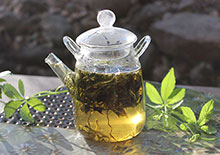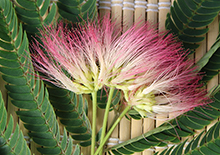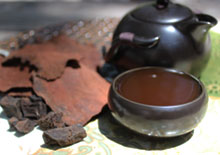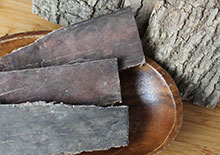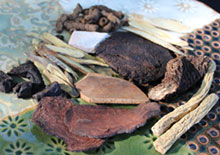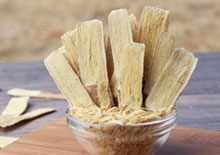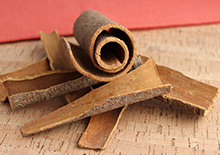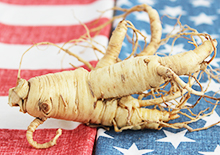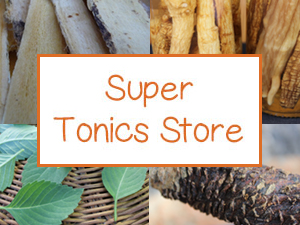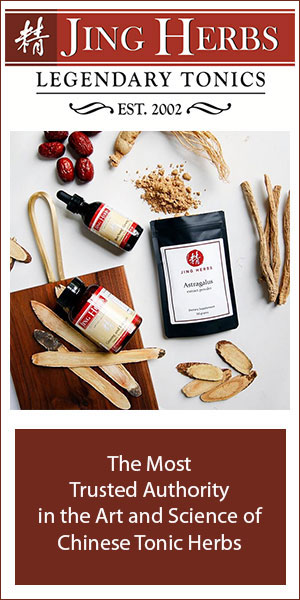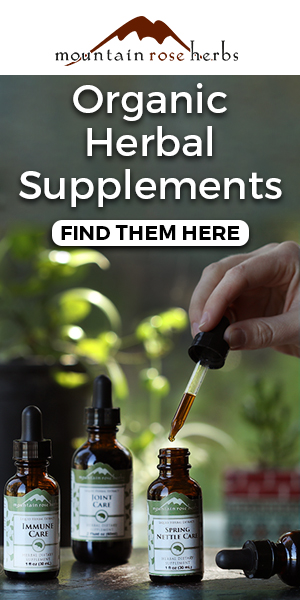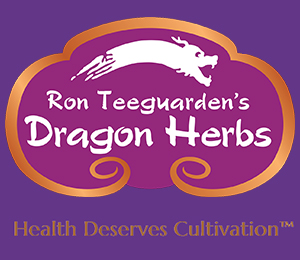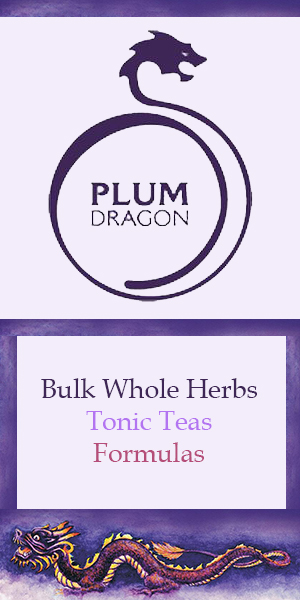- Home
- Chinese Herbs
- Schizandra Berry Tea
Schizandra Berry Tea and Extracts, Beauty Herb and Sexual Tonic
Intro | Constituents | What is Schizandra Berry? | Health Benefits | Types | How to Use | Precautions | Shop
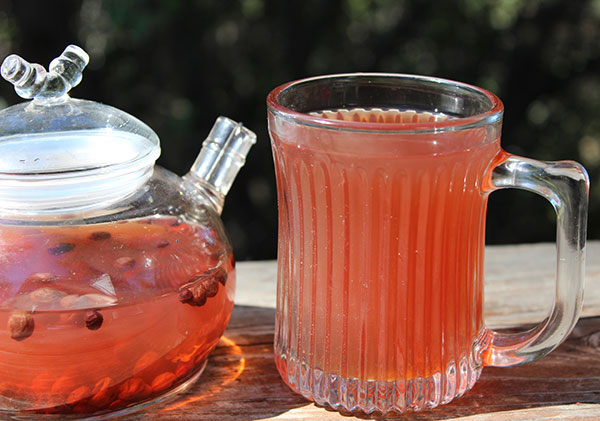
Schizandra berry tea is a delicious and fruity liquid made with one of the top major Chinese herbs, schizandra berries.
Also spelled "schisandra", the fruit has been highly valued since the beginning of Chinese herbalism for its full spectrum of tonifying properties, often prized alongside ginseng, goji and reishi mushroom.
Table of Contents
Intro | Constituents | What is Schizandra Berry? | Health Benefits | Types | How to Use | Precautions | Shop
Unlike other berries, schizandra is not a fruit you would commonly
consume by the handful, but is rather prepared as an energizing and
restorative tonic tea or taken in extract form. It is known to support
and fortify a number of organ systems, but is usually hot water
processed to release many of its beneficial components.
The Chinese name for schizandra is Wu Wei Zi, which means "five flavor fruit." This is due to the fact that schizandra contains all of the five tastes: salty, sweet, bitter, pungent and sour. Because of this characteristic, it is also, according to Traditional Chinese Medicine, able to enter all 12 meridians, which dramatically increases its therapeutic range compared to other superior herbs of this caliber.
Schizandra is said to be nourishing to the bodily fluids and is especially tonifying to the Yin organs of the body, with its greatest influence affecting the kidneys, liver and lungs.
The most noticeable flavor of the berry teas or powdered extracts is definitely on the sour side of the palate spectrum. According to Chinese herbal philosophy, this taste helps to stabilize primal Chi (Qi) of the kidneys and also supports liver function and its ability to purify the bloodstream.
As an adaptogen, the soaked and decocted dried berries provide an energizing tea that helps to increase mental focus as well as sexual libido. In Russian research, schizandra was shown to have a wide range of pharmacological effects and also studied alongside rhodiola for its "anti-stress and anti-fatigue" qualities. (Source)
Schizandra is one of the famous "beauty tonics" highly revered throughout Chinese history, especially by women. It is still traditionally used as an important botanical in many skin rejuvenating and youth preserving formulas that are sometimes associated with the Taoist goddess Magu, a Chinese deity representing eternal beauty.
In TCM, schizandra is viewed as tonifying to all three treasures: Jing, Chi (Qi) and Shen. Because of its therapeutic diversity, it is often considered suitable for a wide range of people and body constitutions.
Although it can be consumed as a straight schizandra berry tea, it is often blended with other tonics, like astragalus, reishi, goji, and licorice root, depending on one's particular condition or health diagnosis.
Schizandra Berry Constituents
Lignans are some of the natural plant constituents concentrated in the berries that exhibit anti-inflammatory, antifungal, antiviral and antioxidant activity. This includes compounds like schisandrin, schisandrol B, schisantherin A, deoxyschisandrin, and schisandrin B, gomisins, and pregomisin.
Some of these elements are additionally responsible for the fruits
hepatoprotective and neuroprotective attributes, which can shield against liver damage and/or nerve related disorders.
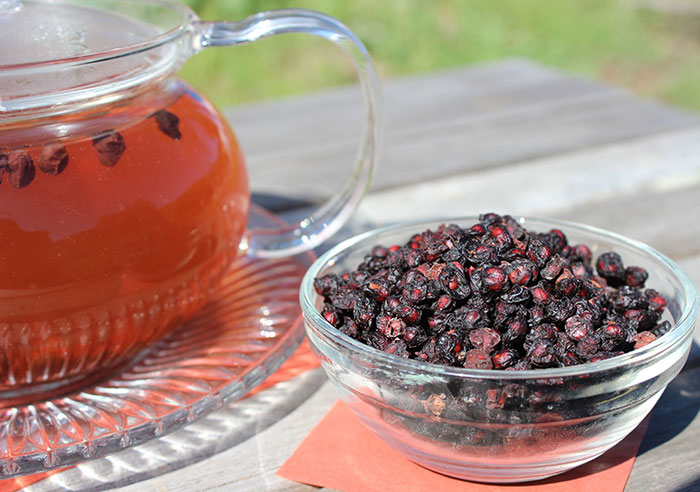
What is Schizandra Berry?
Schizandra berries come from the deciduous woody vine-growing species Schisandra chinensis, also referred to as Magnolia vine.
Native to north and northeastern China, or Manchuria, as well as the lower Russian Far East, the plant produces fragrant white or pink flowers that develop long fruiting clusters of bright red berries.
Schizandra is a dioecious type species that grows as either a female fruiting plant or as a male species. Therefore, the flowers on a female plant will only produce fruit when fertilized by the pollen from a male plant.
It is one of those superfruit species that can be propagated in a number of different climate zones. This can be convenient if you happen to be a gardener and drink schizandra berry tea on a frequent basis. Growing best in USDA Zones 4-8, it prefers partial shade with some kind of trellising.
There are a number of plants, close to 25, in the genus Schisandra, but Schisandra chinensis is viewed as the most medicinal in quality. Species like Schisandra rubriflora and Schisandra sinensis
as well as the self-fertilizing "Eastern Prince" variety are found in
some nurseries as a popular vertical-climbing ornamental plant.
The
berries when used fresh are quite striking, but when dried they shrivel
up and turn a dark maroon-black color and have a rather unattractive
appearance.
This characteristic is in part due to the fact that they have small light brown colored seeds, about 5 mm in size, that become prominent when the berry is dried and loses its moisture content.
Many of the health enhancing compounds found in the berries are also in the seeds themselves.
A highly prized herbal fruit in Russia, called "limonnik", it has been used by the Nanai peoples, according to the journal Pharmaceuticals, "as a tonic, to reduce thirst, hunger and exhaustion, and to improve night vision."
Some of the very first studies on the stimulating and tonifying effects of Schisandra chinensis were published in Soviet Union WWII military journals.
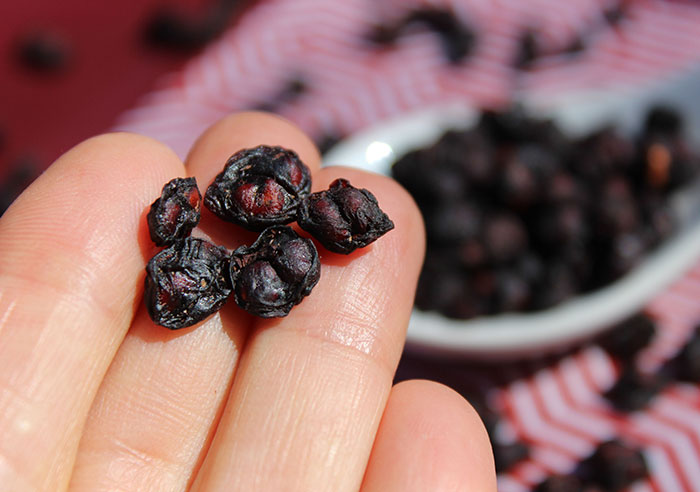
Schizandra Berry Benefits
1) Purifies and Supports Liver
2) Helps to Beautify the Skin
3) Known to Improve Eyesight
4) Natural Energy and Mental Focus
5) Schizandra for Healthy Libido
6) Useful as a Lung Tonic
Purifies and Supports Liver Function
Schizandra berry extracts and teas are known to be gently cleansing to the liver organ, helping to purify the blood and protect the body from environmental or ingested toxins.
In China, schizandra has been respected for centuries as one of the top herbs utilized for a variety of liver disorders.
In an article review
published in the 2015 International Journal of Molecular Sciences
analyzing the therapeutic value of certain herbs on chronic liver
disease, schizandra and its chemical compounds, like Schisandrin B, were
observed from previous studies to exhibit "significant anti-Hepatitis B
virus activity" and identified to have "therapeutic efficiency for the
treatment of hepatitis."
Schisandrin B has been widely used as an antihepatotoxic agent believed to have hepatoprotective (liver protecting) effects against chemical and immunological liver injury. In one reported 2014 study, Schisandrin B was detected to have shielding effects against acetaminophen-induced liver disease from over the counter drugs, like Tylenol.
In more research conducted on rats, results concluded that "administration of SC [Schisandra chinensis} may be useful in preventing and improving fatty liver induced by alcohol."
Helps to Beautify the Skin
Schizandra berry tea decoctions are well-known throughout Chinese herbal history for providing supple and radiant skin with extended use.
As a renowned top beauty tonic specifically used by many Asian women to enhance and preserve a youthful appearance, the berries are especially moisturizing to skin tissue, building "Wei Chi" or the immune defense energy that flows underneath the surface layer of skin. This adaptive quality helps to open and close the pores and can encourage the healing of various skin issues.
Beneficial for those with skin conditions, like acne or psoriasis, teas and prepared extracts are helpful for clearing blemishes and eruptions. This attribute is in part related to its effects at purifying the liver, which is often at the root of many skin disorders.
In one 2015 reported study on mice, schizandra was shown to be of "potential use for the treatment of inflammatory skin diseases" when tested for allergic skin conditions like contact dermatitis.
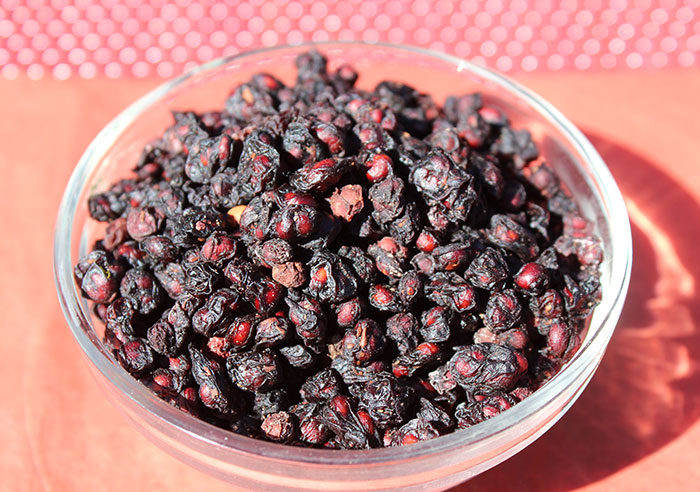
Known to Improve Eyesight
Schizandra berry tea is known to help "clear the eyes of redness", improve night vision and may also enhance the field of vision in ritual tea drinkers. Many of the tonic effects to the eyesight, as with the skin, are a result of the liver cleansing properties that schizandra possesses.
Schizandra, used as a powdered extract, liquid concentrate or tonic tea, works well with other superfruits, such as camu, maqui, golden berries and acai, in blended drinks to further enhance and strengthen the eyesight.
In a recent 2016 analysis using Schisandrin B on zebrafish, it was concluded that "investigations have identified a possible visual benefit of SchB [Schisandrin B] on retinal degeneration, a benefit that can potentially be further developed to extend functional vision in patients."
Encourages Natural Energy and Heightened Mental Focus
Decocted teas, powdered concentrates and extracts provide adaptogenic qualities which naturally boost energy and encourage heightened mental focus. Unlike caffeinated substances, however, these stimulating attributes don't tax the adrenals or encourage jitteriness.
Schizandra provides restorative effects on the central nervous system and, as an adaptogen, helps to reduce negative responses to stress and fatigue in one's daily life. It is a great top superfood for those who suffer from nerve debilitation, chronic fatigue or adrenal exhaustion.
Schizandra is up there with ginkgo and rhodiola
for its brain boosting assets known to promote mental acuity and an improved ability to concentrate. In Russian research is was stated that "Schizandra increases endurance and accuracy of movement, mental performance and working capacity." (*)
In one study,
analyzing different adaptogens, it was shown that both rhodiola and
schizandra had inhibitory effects on the stress-activated protein kinase
it was "suggested that the inhibitory effects of R. rosea and S. chinensis
on p-SAPK/p-JNK activation may be associated with their antidepressant
activity as well as their positive effects on mental performance under
stress."
In the same report it was also acknowledged that herbs like R. rosea and S. chinensis can "accumulate phenolic secondary metabolites", which can play a part in stress response "as would be required in fight-or-flight situations."
Potentially Beneficial to Long Distance Runners
Schizandra is unofficially recognized on a smaller-scale as being a beneficial "runner's tonic", believed to increase endurance yet also improve one's overall experience or "runners high", particularly for long distance activity.
Schizandra has been used in daily regimens by professional Chinese and Russian athletes to improve physical stamina and performance in competitive sports events.
Research shows that its adaptogenic features help to increase physical performance in athletes undergoing heavy physical exercise by helping to stabilize nitric oxide and cortisol levels. (*)
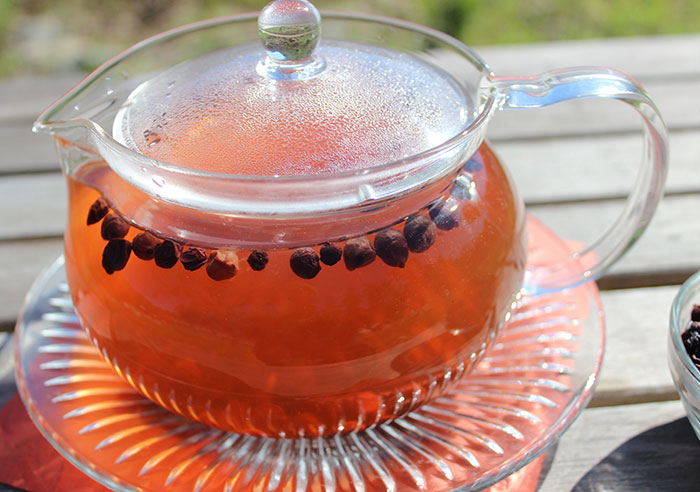
Schizandra Berry Benefits for Healthy Libido
One of the most famous side-effects of drinking schizandra berry tea on a regular basis is its positive effects on the sexual glands and organs. It is one of the top herbal aphrodisiacs for both men and women alike.
According to herbalist Ron Teeguarden, "Schizandra is said to increase the 'Water Qi in the Kidney.' In particular, it is said to support the "water of the genital organs", referring to the sexual fluids. Schizandra is said to support the production of semen. It is famous for its ability to relieve sexual fatigue and for increasing the sexual staying-power in men. It is thus an ingredient in the vast majority of men’s sexual tonics in Asian herbalism."
As a woman's libido elixir, it is known to increase sexual lubrication as well as increase sensitivity and warmth in the female genitals during intercourse.
Schizandra can be used with other tonic aphrodisiacs like ashwagandha, cistanche, tongkat ali and cordyceps to further strengthen its effectiveness.
Useful as a Lung Tonic
The fluid regulating effects of schizandra berry teas make excellent lung tonics for current or past cigarette smokers and are additionally helpful for coughs, sore throats and are frequently used to treat upper respiratory tract infections.
Containing good amounts of vitamin C, they can be infused with elder berries, as a tea or syrup, to create an herbal-based remedy for clearing congestion in the lungs.
In the 2014 Journal of Experimental and Alternative Medicine it was reported that schizandra extracts as well as the Chinese herb peony may be a potential treatment for asthma due to its antioxidant and anti-inflammatory features. (Source)
Types of Schizandra
Some of the most potent types of schizandra berries are known to be sourced from Northern China and regions near the Changbai Mountains. The plant, however, adapts well to a variety of other climate zones and is now also produced on a small scale in the U.S.
- Dried Berries - The most common way to prepare teas is from dried berries.
- Powders - Fine or coarse powders are usually prepared from straight ground berries but are occasionally produced using a freeze-drying process. Dragon Herbs also makes an "eeTee" powdered granule using a specialized raw extraction technique that is temperature controlled under 104° F (40° C).
- Powdered Hot Water Extracts - Extracts are usually made by spray-drying a concentrated tea solution into a powder form, sold in bulk, encapsulated or compressed into tablets.
- Liquid Solutions or Tinctures - Created from tea concentrates or alcohol infused solutions.
- Fresh Berries - Can be pressed to make juice and "schizandra berry wine" or dried for later use.
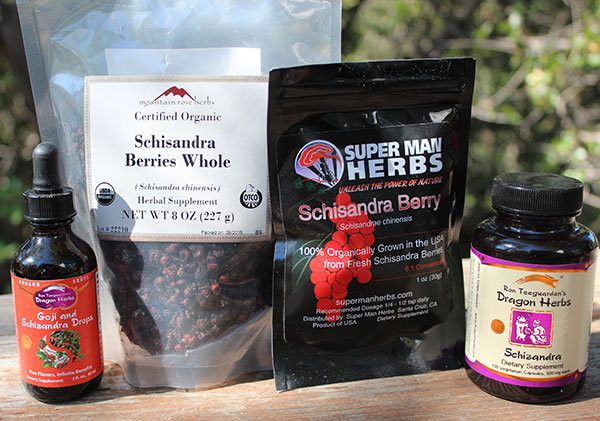
Recommend Schizandra Products
- Dragon Herbs - Offers schizandra as an organic encapsulated powdered hot water extract, a raw eeTee powder and as a solution with goji in their Goji and Schizandra Drops.
- Lost Empire Herbs (Formerly Super Man Herbs) - Provides a organically certified U.S. grown powder produced from freeze-dried schizandra berries.
- Jing Herbs - Has a bulk powder which is created from a spray-dried hot water extract. They test all of their products for heavy metals and other contaminants through in house and third party testing.
- Herb Pharm - This is a certified organic schisandra berry tinctured alcohol extract.
- Planetary Herbals - This is a proprietary blend of schizandra along with other top tonics for adrenal gland support.
- Mountain Rose Herbs - Offers bulk whole and powder schizandra berries that are (as of 2016) sourced from an organically grown supplier in China. They also provide a liquid extract and encapsulated powder.
- Starwest Botanicals - Provide bulk organic schizandra berries as well as a ground powder.
- Hawaii Pharm - Offer an organic alcohol-free glycerin based liquid extract.
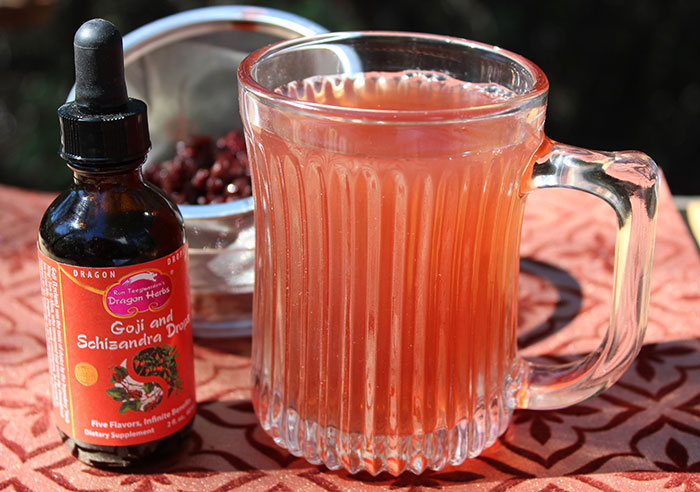
How to Use
Unlike other tonic berries, like goji or longan fruit, they are not usually eaten as a raw or dried berry. This is because they are low in fruit sugars, similar to acai and maqui berries, and are quite sour and somewhat astringent. They also have fibrous seeds that are unpleasant to chew on.
While the berries can be consumed as dried powder when camouflaged into drinks or tea with some health enhancing results, in Chinese herbalism they are most commonly simmered as a tea decoction, especially with other tonic herbs.
Modernized
methods now also make them available, as we mentioned, as hot water extracts in
the form of a bulk powder, capsule or compressed tablet.
When making schizandra berry tea decoctions, the berries are frequently soaked and strained as they contain acidic tannin compounds that can be hard on digestion. The soaking liquid is discarded and the remaining berries are then simmered for 15-20 minutes.
Consumption of schizandra berry teas are traditionally recommended for "100 days in a row" by many herbalists for achieving the highest health enhancing qualities.
For long term use, we recommend buying the whole dried berries in bulk quantities. This will save you money and give you many months of herbal tea brews, especially if you're up for the "100 days in a row" challenge!
When decocoting schizandra as a straight powder, we always advise grinding the whole dried berries in a high speed blender rather than buying pre-made powder that has lost some nutritional quality.
Powdered extracts and liquid solutions can be consumed directly in water or tea, or can likewise be added to blended smoothies and other recipes, imparting a tart citrus-like taste with subtle undertones of other flavors.
Visit our schizandra berry tea recipes page for more information on preparing schizandra or using it with other tonics, like goji.
Schizandra is a great summertime superfood and blends well into refreshing drinks and desserts, like our goji berry lemonade and our homemade superfood ice cream recipe.
Precautions:
While schizandra is relatively safe to consume for a wide range of people, it should be avoided when pregnant as it is a uterine stimulant. It may be appropriate to seek the advice of a qualified Chinese tonic herbalist for additional assistance, when creating individualized herbal formulations for specific health conditions. Consult your healthcare practitioner, before using schizandra, if you are taking prescription medications or have a serious medical illness.
Shop Related Products (About Affiliates & Amazon Associate Paid Links)
Affiliate Disclaimer: This section contains affiliate product links. If you make a purchase through one of our recommended links, we will receive a small commission at no additional cost to you. Thanks for the support!

